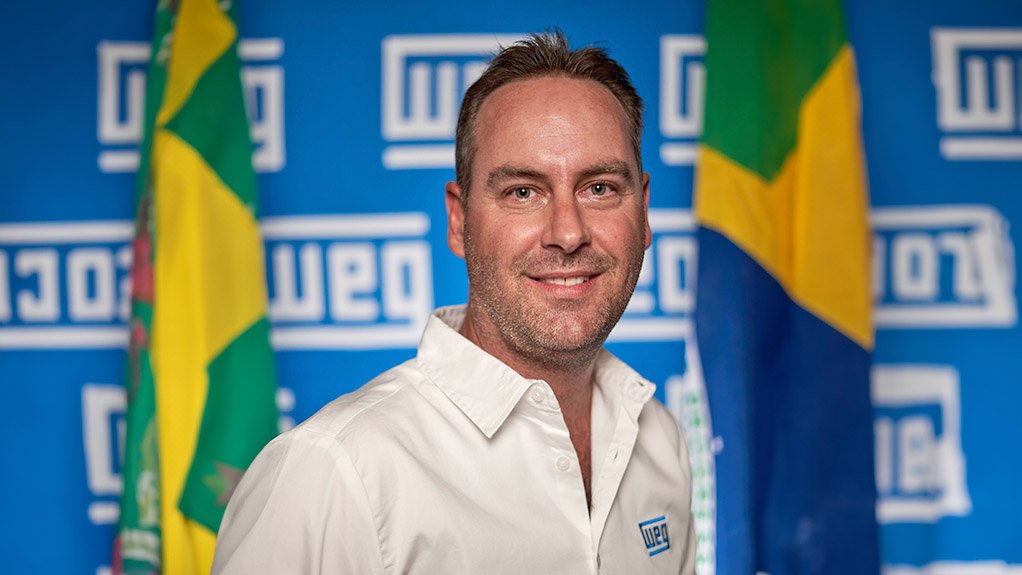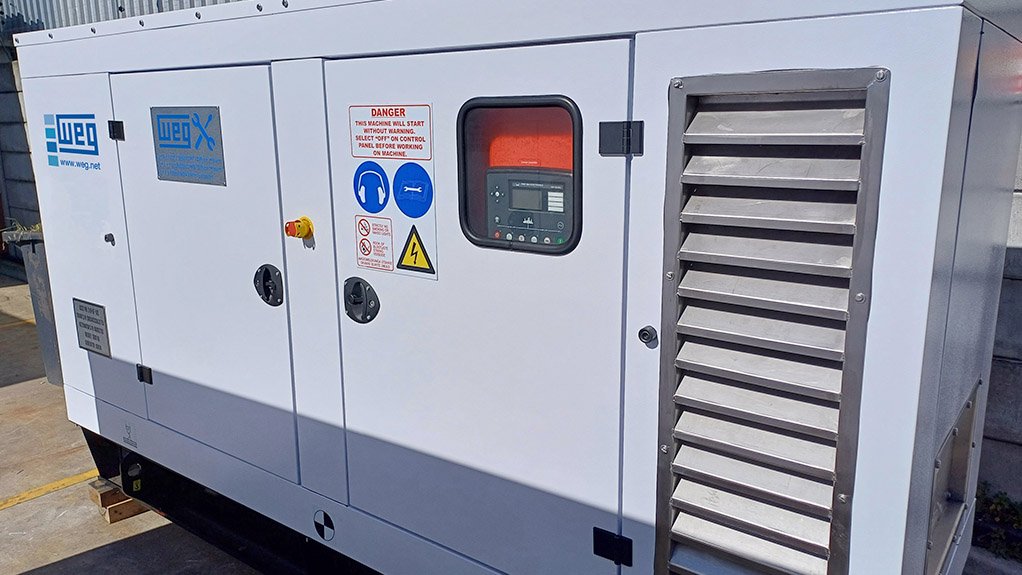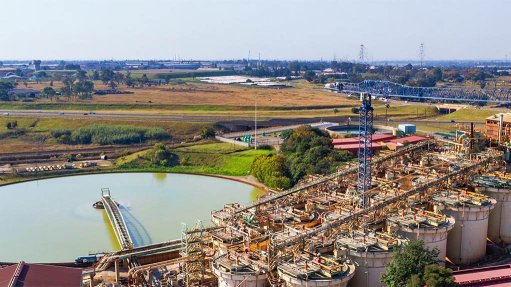Standby gensets not viable option while loadshedding persists



CRAIG BOUWER Failing to ensure that the correct equipment is being procured can have a significant impact on a company financially
POWERING DEMAND WEG Africa is experiencing an uptick in projects in the healthcare, mining and construction sectors. Pictured is a standalone 60 kVA 400 V WEG generator set for a mining application
Selecting a generator set with a standby power rating might have been sufficient ten to 15 years ago but is no longer a viable option to cope with the current severity of local power disruptions owing to South Africa’s energy crisis, says generator manufacturer WEG Africa senior gensets manager Craig Bouwer.
WEG Africa operates a generator manufacturing facility in Cape Town, which supplies standard off-the-shelf generator sets as well as custom-built, application-specific units, with capacities ranging from 10 kVA to 3 350 kVA at 50 Hz.
Bouwer highlights that it is critical to understand specific genset applications — standby, prime and continuous power supply — to ensure that an appropriate backup power solution is sourced.
“Typically, standby rated gensets can only operate between 250 and 500 hours a year. Prior to loadshedding, gensets never came close to these operating hours but are now exceeding them. Therefore, it is not advisable to select a standby genset currently in South Africa, as loadshedding is expected to be a reality for the foreseeable future.”
However, standby generators are still sufficient for their intended application – to support a prime-power-rated generator for short intervals during the downtime needed to perform routine maintenance or attend to breakages.
WEG Africa recommends that companies consider investing in a prime-power-rated generator set that has the specifications to handle the backup power demands necessitated by loadshedding.
“It can run unlimited hours a year based on a variable load. There’re no issues with warranty or overloading the genset if it is sized correctly on the prime-power rating,” advises Bouwer.
For businesses to continue operating and ensure their sustainability amid South Africa’s energy crisis, gensets are a necessity.
“Industries, specifically manufacturing, need gensets. They can’t afford to have their operations grind to a halt and the consequent loss of revenue during loadshedding,” Bouwer emphasises.
Considering Cost
However, WEG Africa finds that many customers buy gensets based on price.
While competitor generators may seem to be more cost efficient compared with WEG Africa, Bouwer says the company offers a high-quality product, backed by aftermarket support, that it knows will be reliable.
Companies are buying cheaper, inferior products with no in-country service parts availability or backup support, which has critical repercussions on their businesses when generator sets fail, he says.
Consequently, WEG Africa is receiving more queries regarding the retrofitting of gensets when customers realise that compatible replacement parts are not readily available.
“We recently received a query from a customer needing repairs to a generator sold by a supplier that has no spare parts availability in the country or aftersales support. The customer initially bought the generator based on price but is now reliant on WEG Africa for repairs and it’s costing them more than if they had come to us from the start,” explains Bouwer.
For example, if an alternator on a genset fails, and no replacement part can be sourced locally, to install a replacement alternator from WEG Africa, modifications may be required to the generator’s base frame or enclosure.
Therefore, it is not only the initial cost of the generator or potential third-party components needed for maintenance or repairs that need to be considered, but the various modifications that may be necessary over the lifespan of the genset to ensure it remains operational.
“Failing to ensure that the correct equipment is being procured can have a significant impact on a company financially. Cheaper is not always better,” stresses Bouwer.
Demand Side
While local demand for generators is currently erratic and susceptible to the severity of loadshedding, there is an uptick in projects in the healthcare, mining and construction sectors, says Bouwer.
“Loadshedding assists with sales in a sense but is not what we rely on. Demand for reliable backup power is constant from the healthcare, mining and construction sectors, but development slowed significantly a year or two after Covid-19, owing to the impact of the pandemic on economic activity. We are finding it extremely busy in these sectors at present.”
Most recently, WEG Africa successfully supplied eight customised low-capacity generators, with capacities of 60 kVA, 100 kVA, 400 kVA and 1000 kVA, to a mining project in Côte d’Ivoire. The project was a first for WEG Africa, which generally supplies larger generators into Africa.
This is a group turnkey project, where the WEG Africa genset engineering team in Cape Town travelled to Brazil to ensure that the plant controls supplied by another WEG Group company were executed and tested correctly so that when the order was delivered to site, the company could be confident that the system would work.
The power of the WEG group is in its ability to deliver turnkey solutions, advances Bouwer.
“There’s good communication and coordination throughout the group to ensure that the equipment is specified and set up correctly. That’s probably one of our biggest value adds – we can supply multiple items or components for a project.”
As a local manufacturer of generator sets, WEG Africa is extremely flexible in its product offering, tailoring solutions to meet a customer’s specific requirements, no matter how stringent, for any application, he adds.
“Our standard generator stockholding ranges from a 10 KVA to a 700 kVA and includes all relevant components. Anything larger than that is generally based on tender specifications and customer-specific requirements. Such components are procured specifically for projects that generally have a six- to 12-month lead time,” Bouwer advises.
Article Enquiry
Email Article
Save Article
Feedback
To advertise email advertising@creamermedia.co.za or click here
Press Office
Announcements
What's On
Subscribe to improve your user experience...
Option 1 (equivalent of R125 a month):
Receive a weekly copy of Creamer Media's Engineering News & Mining Weekly magazine
(print copy for those in South Africa and e-magazine for those outside of South Africa)
Receive daily email newsletters
Access to full search results
Access archive of magazine back copies
Access to Projects in Progress
Access to ONE Research Report of your choice in PDF format
Option 2 (equivalent of R375 a month):
All benefits from Option 1
PLUS
Access to Creamer Media's Research Channel Africa for ALL Research Reports, in PDF format, on various industrial and mining sectors
including Electricity; Water; Energy Transition; Hydrogen; Roads, Rail and Ports; Coal; Gold; Platinum; Battery Metals; etc.
Already a subscriber?
Forgotten your password?
Receive weekly copy of Creamer Media's Engineering News & Mining Weekly magazine (print copy for those in South Africa and e-magazine for those outside of South Africa)
➕
Recieve daily email newsletters
➕
Access to full search results
➕
Access archive of magazine back copies
➕
Access to Projects in Progress
➕
Access to ONE Research Report of your choice in PDF format
RESEARCH CHANNEL AFRICA
R4500 (equivalent of R375 a month)
SUBSCRIBEAll benefits from Option 1
➕
Access to Creamer Media's Research Channel Africa for ALL Research Reports on various industrial and mining sectors, in PDF format, including on:
Electricity
➕
Water
➕
Energy Transition
➕
Hydrogen
➕
Roads, Rail and Ports
➕
Coal
➕
Gold
➕
Platinum
➕
Battery Metals
➕
etc.
Receive all benefits from Option 1 or Option 2 delivered to numerous people at your company
➕
Multiple User names and Passwords for simultaneous log-ins
➕
Intranet integration access to all in your organisation


















